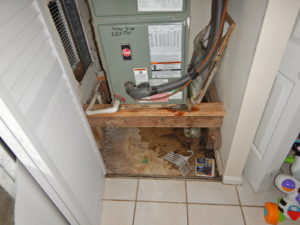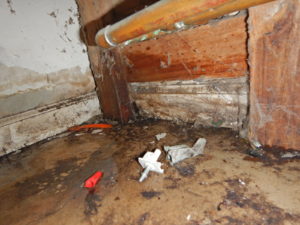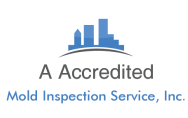Have someone recently tried inspecting for mold in your home. Do you strongly suspect the mold inspector did a sloppy job and missed mold? Do you still smell mold? Are still getting sick? Did a previous consultant rely heavily on air samples and neglected to conduct a detailed mold inspection while inspecting for mold in your home?
Call us at A Accredited Mold Inspection Service, Inc.
We conduct mold inspections in Miami, Cutler Ridge, Kendall, and North to West Palm Beach, Ft Lauderdale and all of South Florida.
We may be able to help with a second opinion 1-888-381-6651.
Case Studies
I once conducted an inspection for the source of mold odors in a 4000 square foot home in Cutler Ridge, South of Miami Fl. This was not the first mold inspection at this property. The clients had previously had the property inspected for mold a month earlier just before they purchased the home.
That initial inspector did pick up elevated spore levels but failed to detect the mold odors with his nose, and he failed to visually locate the source of mold while inspecting the property.
During my inspection, I discovered that the property had mold in two locations:
1) One was in the AC closet.
2) The other was in a front end loaded clothes washer.
AC Closet Mold

When inspecting for mold, is is important to check the AC closet. This Miami AC closet has moisture damage on the floor under the AC unit.
1) AC closets are notorious for having mold and moisture damage. Most AC units leak condensation water some time in their lives. These leaks often go unnoticed for weeks, months, or even years before they are discovered and corrected. These condensation leaks are usually not hard to find if you know what to look for.
I must say, in regard to the Miami home I mentioned above, it is unfortunate that the initial mold inspector did not simply open up this AC closet, get on his knees, and inspect for mold under the AC unit.

Closer view, when on one’s knees, it is possible to see moisture and mold under the AC. This is Not the the same AC discussed in this article. Mold and moisture damage under AC units is something we find commonly.
Front End Loaded Washer Mold
2) The other mold problem in the same home was on the rubber gasket inside the front end loaded clothes washer. This was on the opposite end of the home. This Cladosporium mold growth on the clothes washer gasket caused the entire laundry room to smell moldy, and have elevated spore levels.
The amount of mold growing in any washer is not likely to be excessive. It is not as much a health concern as the above mentioned mold found in the AC closet. However, in the washer, the mold growth was heavy enough to create quite a noticeable foul odor in the entire laundry room.
More recently I found the exact same mold problem on the gasket in a front end loader washer in a 6000 sf home during a mold inspection in Boca Raton Florida.
Regarding the clients with the mold in the washer, they are not the only people with a moldy clothes washer. This is in fact a chronic problem with some front end loading washers.
The following information is from consumer reports. “Front-loaders don’t have a spotless reputation. One issue seems unique to front-loaders: mold buildup in the rubber gasket of the door and the resulting odor on clothes. The mold problem is so widespread that class-action suits are targeting LG, Whirlpool, and Sears, whose Kenmore front-loaders are made by Whirlpool. The Maytag Neptune front-loading washer line has been part of a similar lawsuit, for which a settlement was reached.
If you are interested in learning about mold or bacteria in other unusual places around the home visit this page. It discusses microbial growth in humidifiers, baby toys, and more.
The Problem With Mold Inspections
The problem we find is that mold inspectors often feel that they are testing your air for mold and not inspecting for mold. If a true mold odor is present, the inspector should inspect until the source of mold odor is discovered. In the above case, the inspector missed mold in two moldy smelling areas of one home. The AC closet, and a front end loaded washer.
In a laundry room with mold odor, anything wet should be inspected for mold, including something as seemingly innocent as a clothes washer door gasket. I can honestly understand if a mold inspector neglects to open a front end loading washer to inspect for mold. This type of mold problem does not usually cause elevated mold spore levels, nor mold odors. However, in the case we discuss here, the odors were quite noticeable, and spore levels were elevated. In the above case the problem was pretty severe and noticeable.
The Solution
In conclusion, we mold inspectors should be testing your air for mold. More importantly we should be visually inspecting anything that could conceivably be a breeding ground for mold. Most people find it hard to believe, but true inspectors solve more mold problems with our eyes and minds than with overrated tools and testers.
If a mold inspector must lay on his back to do an inspection for mold on the bottom side of evaporator coils in an AC unit then this is what must be done. If an inspector must check for mold on clothes in a humid closet, or humid drawer, then this is what must be done. These are all places very commonly overlooked by many mold inspectors. In addition, these are all places where mold very commonly grows. Thus, these are all places where our inspector routinely checks.
Final Conclusion
In conclusion, such inspection measures are often needed because mold will grow anywhere moisture contacts a surface, or anywhere warm humid air contacts a cool surface.
If you feel that you need a second opinion after a previous mold inspection then contact us at:
1-888-381-6651
A Accredited Mold Inspection Service, Inc.
We are here to help.


